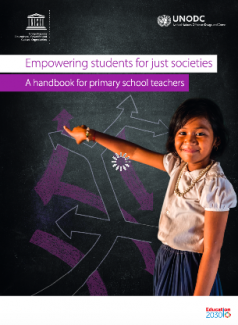Empowering Students for Just Societies: A Handbook for Primary School Teachers

Foreword
Education has transformative power. It is broadly recognized that education plays a pivotal role in shaping the values of future generations and creating inclusive, peaceful, just and sustainable societies. To ensure that the next generation is ready to become proactive agents of change, the international community, governments and societies must invest in quality education.
Contemporary challenges to the rule of law are of concern for many societies across the world. These challenges take different forms from one society to another – from the decline of public trust in institutions to corruption and, in some cases, violence. In some societies, children are led to believe from an early age that the absence of the rule of law is not just common, but acceptable. Education has a key role to play in equipping children with the necessary knowledge, values, skills and attitudes to face challenges related to the rule of law and engage responsibly in society.
Empowering children to become agents of change and harnessing their energy and creativity through Global Citizenship Education is key to establishing a global community where integrity, ethics, non-discrimination and respect for the rule of law are key societal pillars. This contributes to advancing the objectives of the United Nations charter - that is to maintain international peace and security. Teachers play a critical role in this by nurturing current and future generations throughout their development to possess a keen awareness, a robust moral compass and sound critical thinking skills that can be transposed constructively onto their daily lives.
Building bridges and partnerships between the justice and education sectors contributes to the achievement of Sustainable Development Goals 4 on quality education and 16 on peace, justice and strong institutions, which are key enablers for achieving the 2030 Agenda for Sustainable Development. With this understanding, the United Nations Educational Scientific and Cultural Organization (UNESCO) and the United Nations Office on Drugs and Crime (UNODC) have established a partnership on Global Citizenship Education for the Rule of Law: Doing the right thing.
This handbook for primary school teachers is a collaborative effort between UNESCO’s Global Citizenship Education (GCED) and UNODC’s Education for Justice (E4J) initiative, which is part of the Global Programme for the Implementation of the Doha Declaration. As part of this partnership, UNESCO and UNODC have also developed a handbook for secondary school teachers that offers access to activities, lessons and units which aim to strengthen the rule of law and promote a culture of lawfulness.
Stefania Giannini
Assistant Director for Education
United Nations Educational, Scientific and Cultural Organization
John Brandolino
Director, Division for Treaty Affairs
United Nations Office on Drugs and Crime